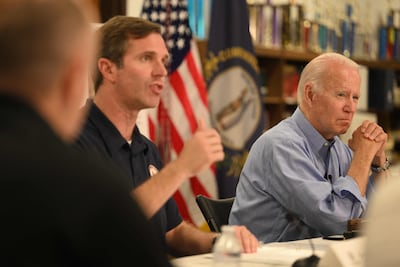US President Joe Biden applauded the sweeping Inflation Reduction Act, promised federal recovery support, and emphasised the threat of climate change after landing on Monday in the flood-ravaged state of Kentucky.
"(The federal government) is staying until everybody's back to where they were, and that's not a joke," Mr Biden said after meeting families who lost their homes to the floods.
"As you all know, we've suffered the consequences of climate change with a significant number of weather catastrophes around the nation," he said at an earlier meeting with local officials.

The trip comes after the passing of the Inflation Reduction Act of 2022, which will provide $370 billion to tackle global warming through measures to reduce greenhouse-gas emissions by 40 per cent by 2030.
"We're going to put a new water line in the community," Mr Biden said. "There's no reason why they can't at the same time be digging a whole new modern line for internet connections.
"It's going to be different, we're going to come back better than before … We're the only country in the world that has come out of every major disaster stronger than we went into it."
Mr Biden and his wife Jill were greeted in Lexington by fellow Democrat, Governor Andy Beshear and his wife Britainy, and Lexington Mayor Linda Gorton.
The president is scheduled to assess recovery efforts.
Appalachian communities on the state’s eastern edges were devastated by floods late last month, which killed at least 37 people and sent hundreds into government emergency shelters, the governor’s office said.
The president expressed "heartbreak" over the devastation to the region known as the “Bluegrass State” for its blue-flowered grass.
"You look at creeks and streams that are now running brown … and you can see from the helicopter, see automobiles, buses and homes literally in the middle of the water," Mr Biden said.
Mr Beshear praised the president's fast emergency declaration for the state, and the work of first responders and aid workers for the clean-up progress so far.
"We are out of the primary emergency phase … We need now the dollars for the medium and long-term rebuilding," he said.
Road to recovery
While state officials have moved on from emergency stages, the recovery battle has only begun.
"There's a consensus that no one has ever seen anything like this," said Baylen Campbell, who is working in flood relief at Invest Appalachia and is chairman of Appalachians for Appalachia.
"Some areas don't have roads accessible to them, because the roads have been wiped out," Mr Campbell said.
"So you have to hike over the side of the mountain in some places … At this point, we're trying to just ensure that folks are safe and healthy, and that we can provide them with a sense of dignity."
With a long history of under-investment and labour extraction, the region is among the country's poorest, which is compounding the devastation.
A US Census Bureau study reported average household incomes well below the national poverty line, from $19,000 to $24,500, compared with the national average of $57,652.
Mr Campbell, who is based in Hazard, Kentucky, and organising flood relief efforts throughout the area, said some are expected to go without power for weeks.
He said that some people in more rural areas are still predominantly on well water and lack internet access.
The trip comes after the White House granted Mr Beshear’s request to elevate available disaster relief funds to affected parts of Kentucky from 75 per cent of the total eligible costs to 100 per cent for a 30-day period.
Residents are particularly anxious for increased support, as the daunting recovery process continues amid a surge in Covid-19 cases and new weather warnings.
The National Weather Service extended flood watches and thunderstorm alerts in the region at the weekend.
For Mr Campbell, outside aid and support has helped recovery, but there is healthy scepticism from the community that it will endure long-term.
"We also understand that this influx of support and volunteers will wane, and that there is an urgent need to go ahead and start planning for long-term recovery," he said.
"We've seen a lot of amazing support in terms of financial donations and folks coming in with material donations in to volunteer.
"But we're working in communities that didn't have the infrastructure or housing needed to manage the people that we had here prior to the flooding."

In Appalachia, community support is tethered into the cultural fabric.
"Folks are resilient, people here have stepped up," Mr Campbell said. "That's because there's a deep sense of community and connection to this place … folks here are used to doing more with less because that's what they have to do."
He said the community hoped Mr Biden's visit would lead to concrete action to support the long-haul recovery.
This includes prioritising locally led organisations in designing state and federal aid efforts, and investing in the region's post-coal economy.
















